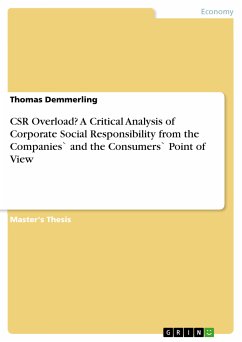Seminar paper from the year 2004 in the subject Business economics - Business Ethics, Corporate Ethics, grade: A- = 1-, International University in Germany Bruchsal (Department of Sciences and Liberal Arts), language: English, abstract: In the aftermath of recent business scandals such as Enron, Worldcom, and Parmalat the discussion about ‘Ethics in Business’, which was not exactly a hot topic during the last 20 years or so, has been inflamed anew. However, ethical corporate governance, the catch line of countless discussions in recent times, is only one but many aspects to ethics in business. This paper will focus on the aspect of corporate social responsibility rather than the issue of corporate governance. Although not as hot as corporate governance, corporate social responsibility is certainly no less important as incidents like the Exxon Valdez accident in 1989 clearly demonstrate. In fact, corporate social responsibility even covers the t opic of corporate governance since governance failures as observed at companies like Enron do not only hurt a company’s shareholders but to a large extent also most of a company’s stakeholders - which in the end often make up a considerable part of society. Milton Friedman’s (in-)famous 1970 article “The social responsibility of business is to increase its profits” will serve to represent the libertarian view which assumes great credibility to concepts like ‘Agency Theory’ and the ‘Invisible Hand’. After elucidating Friedman’s ‘classical’ liberalist approach, which in itself makes perfect sense, this paper will point towards the deficiencies of Friedman’s argument. By applying a broader understanding of how corporate social responsibility is to be derived i t becomes obvious that Friedman is telling only part of the story. This consideration will then serve as a foundation for the attempt of developing a framework of corporate social responsibility which goes beyond increasing profits only. [...]









